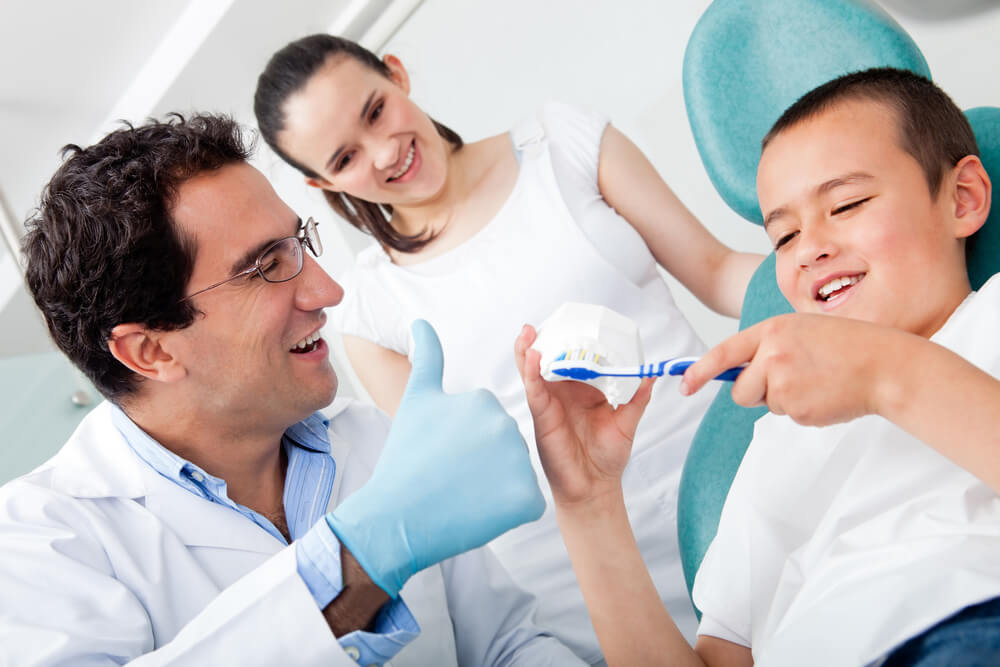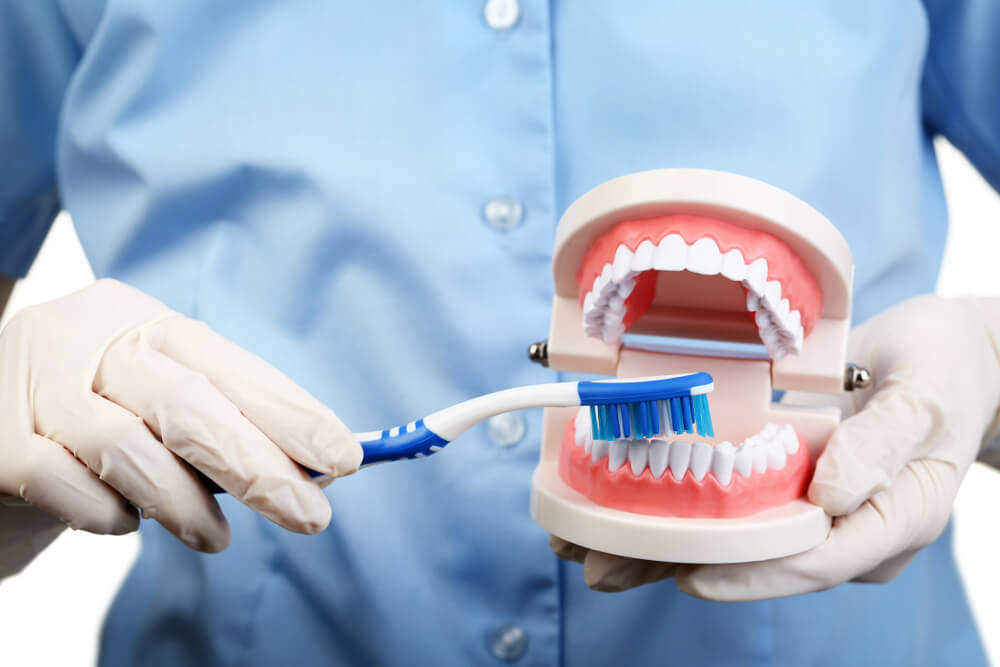Preventive dentistry is an important part of keeping teeth strong and healthy. It involves both oral hygiene at home and regular checkups at the dentist. Though these steps may seem relatively straightforward, they serve as a powerful combination in maintaining lifelong oral and overall health.
What Is Preventive Dental Care?
We can define preventive dental care as efforts made to prevent oral health issues, like tooth decay, gum disease, or enamel erosion, from occurring. It’s basic proactive care for teeth and gums that, when done regularly, makes a big difference in staying healthy and maintaining a bright smile.
Consistent and proper care of teeth and gums at home, including regular brushing and flossing, is the first step in preventive dentistry. A regular habit of oral hygiene prevents plaque buildup, disease, and decay and keeps mouths and bodies healthy.
Personal care at home is only part of the battle, however. Routine visits to the dentist for checkups are also indispensable and necessary for deep cleaning in areas that daily brushing and flossing might not reach.
Checkups also allow dentists and hygienists to spot and treat problems, such as periodontal disease and tooth loss, before they become advanced. Checkups are at the heart of what is preventive dental care.

Why It’s Better to Be Proactive
Prevention is always better than a cure. It’s easier to stop oral health problems than it is to repair them. And preventive dental care not only reduces the risk of cavities and other oral health issues but also avoids secondary problems, including diabetes and cancer.
Dental preventive services ultimately save people pain, money, and health complications down the road. The following are reasons for maintaining oral hygiene and scheduling regular visits with the dentist:
- Lower costs – Dental preventive services cost less than restorative work. Modern dentistry does have access to effective remedial tools, including crowns, fillings, and implants, that go a long way toward correcting issues. Proactive prevention, however, costs much less, which is why many insurance providers cover most or all preventive treatments.
While it may seem counterintuitive, the up-front costs for regular checkups by a preventive dentist will, in the long run, be much lower than entirely avoidable work like tooth extraction and prosthetics. Costs for full mouth restoration can ultimately run into the tens of thousands.
- Pain and discomfort – The mouth has a lot of nerve endings, which open up the potential for pain. Because preventive dental care reduces the likelihood of tooth decay or gum disease, it also reduces the chances of significant pain.
- Avoiding the dentist’s chair – A few minutes dedicated to flossing and brushing each day are clearly preferable to hours of remedial work in the dentist’s chair.
- An improved self-image – Issues with oral health can also negatively affect someone’s social life. Bad breath or discolored or misaligned teeth can impact confidence in public. Guarding oral health not only protects overall health but also provides for a healthy self-image.
Medical Risks Surrounding Poor Oral Hygiene
Preventive dentistry also means better body health. The mouth is a haven for bad bacteria. Keeping the mouth in good condition and free of dental problems also keeps the body in better shape. Doctors can link gum disease, bacteria, and chronic oral infections with several medical conditions. These include:
- Heart disease
- Pneumonia
- Arthritis
- Osteoporosis
- Diabetes
- Dementia and cerebrovascular disease
- Higher risk of cancer
- Stroke
Periodontal disease can also lead to increased chances of pancreatic disease and a higher risk of bone loss in diabetics.
Tips for Preventive Dental Care
The following are preventive measures to keep teeth and gums healthy and smiles bright:
- Regular brushing – Two minutes of brushing with fluoride toothpaste in the morning and before bed is essential. Toothbrushes will also need replacing twice per year at a minimum. Toothbrushes and toothpaste should show the ADA Seal of Acceptance from the American Dental Association.
Daily flossing, preferably before bed, also removes food particles in areas that toothbrushes can’t reach. And American Dental Association-approved mouthwash disinfects hard-to-reach places.
- Diet – A balanced and healthy diet applies to both oral and overall health. It should include calcium-rich foods to reduce the chances of jawbone deterioration, and it should omit acidic and excessively sugary foods and drinks.
Sugars collect easily on teeth. Bacteria found in plaque then feed on residual sugar and produce lactic acid, which ultimately results in eroded enamel and tooth decay.
Acidic drinks, including both regular and sugar-free sodas, also contribute to tooth decay. A rinse with fluorinated water is a recommended practice after acidic or sugary drinks or food.
Fruits and veggies are good food alternatives and an essential part of what is preventive dental care. High levels of vitamin C in such items as broccoli, kale, or leafy greens also help combat gum inflammation.
- Fluoride – Dental preventive services can provide fluoride applications during a checkup.
Fluoride, which strengthens the tooth’s outer enamel layer, can apply directly in the form of a gel, foam, or varnish. According to the ADA, fluoride can reduce decay by as much as 40% and even reverse decay in its early stages.
Fluoride applications are especially important for people who get their water sources from private wells. Cities fluoridate public water but not typically well water.
- Sealants – Sealants are another protective measure supplied by a preventive dentist. Fluoride is only effective on smooth surfaces. Back teeth, however, have more nooks and grooves and benefit from the added protection of sealants.
Sealants consist of plastic resin that hardens on tooth exteriors. They do their job by covering grooves and cracks and protecting teeth. For children, sealants can even prevent cavities by as much as 80%.
- Radiographs – Radiographs, or X-rays, are an essential proactive and preventive measure. They allow a preventive dentist to detect hidden problems and treat them before they become advanced.
Preventive Care Through Regular Checkups
Professional cleanings are fundamental to successful preventive care. The ADA recommends two visits per year.
Professional cleaning is standard in most checkups and will remove both tartar and plaque, which can build up even after regular brushing and flossing. Hardened plaque, called tartar, is only removable by a hygienist or dentist.
Dentists also check for early signs of deterioration in the form of enamel erosion or tooth decay. Signs a dentist will look for include:
- Enamel softness or discoloration
- Plaque or tartar buildup
- Signs of periodontitis in the form of separations between the teeth and the gums
- Signs of throat or mouth cancer
Preventive Care for Kids

Dental care is still the nation’s most unmet health care need among children and the most common chronic health issue. If gone untreated, cavities can have a real impact on a child’s life. Consequences can be health issues, significant pain, a loss of appetite, and lower performance and attendance at school.
Early professional cleanings and exams, conducted by preventive services, will stay ahead of bacterial buildup and put children on the road to long-term dental health. Routine early visits also help reduce anxiety about trips to the dentist. Dentists recommend checkups even before a child’s first birthday since temporary baby teeth are critical to establishing room for later permanent teeth.
Talk to Us
Now’s your turn. What questions do you have about preventive care and keeping teeth and gums healthy? At Dental and Facial Aesthetics of South Florida, we’re prepared to answer all your questions. Ours is a full-service luxury practice and professional clinic offering a spa-like experience, and we’re dedicated to oral health and making bright smiles real. Contact us to schedule a visit today.


